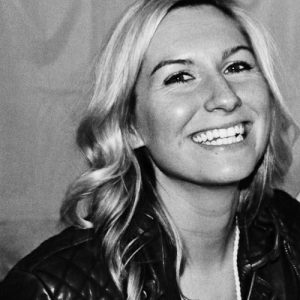STEPH HYATT ’15

Steph Hyatt checks in with us about her current role in art consultancy, previous experiences along the way, and life in Atlanta.
Art Consultant
Wendover Art Group
Atlanta, GA
WFU Class of 2015
Major: Art History
Minor(s): Communications & Entrepreneurship and Social Enterprise
DeacLink: What did you study at Wake? How has your career unfolded since?
Steph Hyatt: I studied Art History and double minored in Communication and Entrepreneurship and Social Enterprise (ESE). When I graduated, I moved to London where I received a Masters in Entrepreneurial Leadership in Global Business and also worked in B2B Marketing at a financial services firm. I continued working in that field when I first moved to Atlanta in 2016 but now am an Art Consultant at Wendover Art Group. When I graduated, I never imagined I’d be here but I genuinely love what I do and my team is incredible.
DL: Would you mind telling me more about what you’re doing at Wendover? What’s it like working in the commercial art space?
SH: I work at the Atlanta branch of Wendover Art Group with 12 other art consultants. Our company is one of the biggest suppliers of commercial artwork, mostly for hotels. We not only advise customers on artwork to use for their public space and guestrooms, we also work with artists directly to license their work and manufacture all of the art in-house at our state of the art facility in Tampa, FL.
A lot of people think I just pick out art all day but that’s not at all the case! art consultants wear a lot of hats – I’m in constant contact with our pricing team, graphic design, vendors, logistics, and of course with our customers too, all to ensure we’re delivering superior value and a high quality product.
Some of the projects I’ve worked on are incredibly ambitious but the end result is amazing. It’s such an incredible feeling when you see art you helped bring to life hanging at a major hotel!
DL: How much did your time at Wake inform your career path?
SH: A lot of the time I spent at Wake I was just focused on taking classes I thought were genuinely interesting and would challenge my thinking. The Business School never appealed to me because I felt like I had the rest of my life to learn more about business.
When it comes to applying for jobs, I think more and more corporations are warming up to hiring graduates from a variety of academic backgrounds. Your unique path can even work to your advantage if you can demonstrate that you’ll bring a fresh perspective to that work environment.
DL: How have you found the different jobs and internships you’ve had?
SH: The corporate world may seem scary to someone just joining the workforce but generally people want to give you the tools you need to succeed. I promise the Miranda Priestly’s of the world are a rarity. Your mentor or boss wants you to grow in your role so don’t let age or lack of experience prevent you from taking on more responsibility! The things that would have made me cry when I first graduated don’t even give me pause now and that strength comes from saying yes to difficult opportunities.
DL: What advice do you have for students considering applying for a “practical” masters after have an undergraduate degree in art or art history?
SH: I wouldn’t worry so much about obtaining what you think is a “practical” masters. Assess your strengths and apply yourself to pursuing a role that complements those strengths instead.
If you decide to go for another degree, that’s great! But do so because you’re passionate about what you’d be studying, not because you feel like it’s the only way an employer will take you seriously. I view my masters degree as more of an interesting footnote on my resume, rather than the highlight.
DL: How do you like living in Atlanta? What advice do you have for students considering pursuing a career in the city?
SH: I love Atlanta. After living in London and in Winston-Salem, Atlanta feels like the perfect mix of a big city but is accessible enough for someone who has just graduated. There’s always something to do and people are for the most part really friendly.
I really recommend researching the location of any jobs you apply to in Atlanta – a lot of companies will claim their office is in Atlanta but really the commute is 45 minutes or more outside of the city!
DL: What do you think Wake arts could do to better prepare students for life after graduation?
SH: I think programs like DeacLink are definitely a step in the right direction – I knew when I graduated I wanted to work at a corporation (not in higher education or the non-profit sector) but I didn’t have much direction beyond that. It just felt like there weren’t many resources out there that defined different career possibilities with an Art History degree. I honestly never thought I’d use my degree again!
DL: What’s the best kernel of advice you can think to pass on to current students and recent alums?
SH: No matter where you end up right after graduation, even if it’s a job you’re not thrilled about, view your first job as an immense opportunity to learn as much as you can about how successful businesses operate.
Understanding and appreciating how your role impacts the business gives meaning to your work and so many of the skills you gain as an entry level employee carry on to your next opportunity, even if you make a 180 degree pivot like I did! Show up, work hard, make yourself an asset and doors will open for you.
